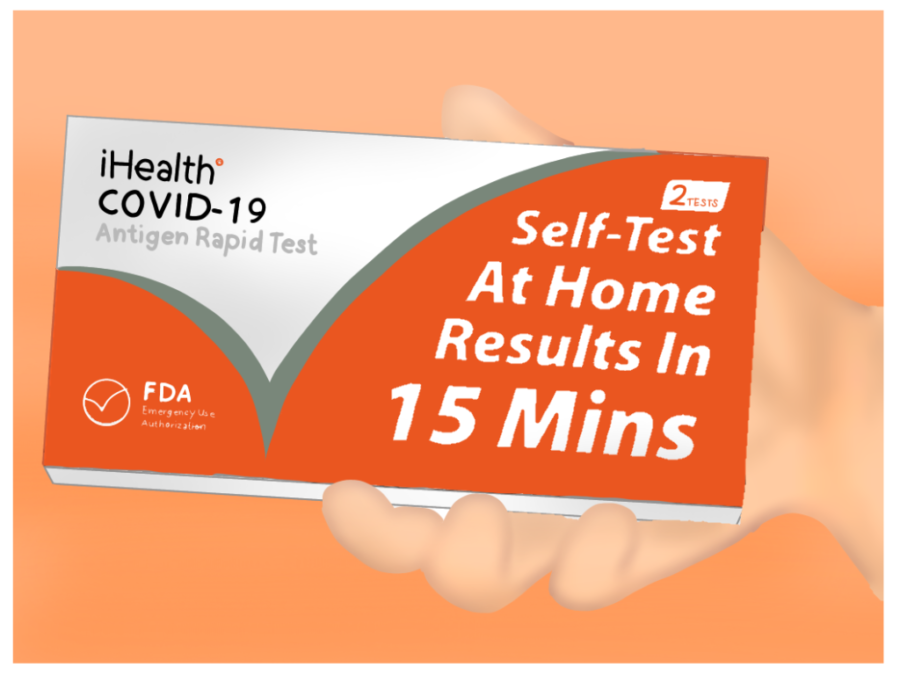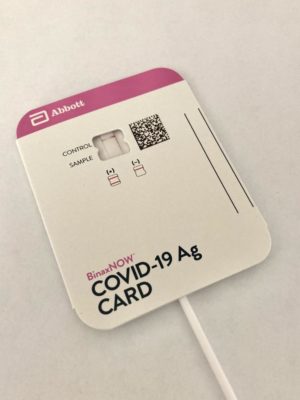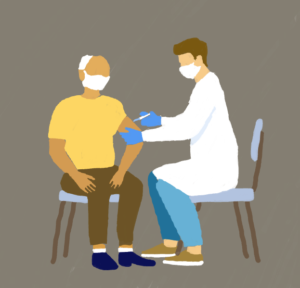What You Need to Know: COVID-19
The rapid test pictured above has been distributed throughout America, as people are able to figure out if they have Covid-19 from the comfort of their own homes.
April 4, 2022
COVID-19
What to do once you find out you have Covid-19?
Once you find out you are infected with the Covid-19 virus, you should:
- Stay home
- Take care of yourself
- Stay in touch with your doctor
- Separate yourself from other people
- Tell close contacts/people you may have exposed
- Stay sanitary
What to do in our county?
In Contra Costa county, everyone must wear face coverings in indoor public settings, with the entire state requiring the same rule until Feb. 15, 2022. Other updates have been made regarding isolation and quarantine guidance, travel advisory, requirements for large events and requirements for visiting hospitals and nursing homes. People must also show proof of COVID-19 vaccination, or in some cases a negative test result, to enter dining or fitness establishments. Furthermore, the county also recommends that businesses consider further protective measures.
How can we prevent the further spread of COVID-19 and its variants?
The main things we can do to prevent further spread are wearing a mask, getting vaccinated (including boosters), maintaining a six foot distance from other people in public, and avoiding large gatherings with people who are sick.
Omicron and other variants
What is the current situation of Omicron?
Omicron is the latest strain of the Covid-19 virus, originally identified in Botswana and South Africa. It is currently the primary variant in the United States. Omicron is highly transmissible, but causes milder infection. An early real-world study in South Africa showed the Pfizer-BioNTech vaccine was 33% effective at preventing infection and 70% effective at preventing hospitalization.
Omnicron is here and it is spreading fast. Records are being surpassed as more and more Americans are getting hit with this very infectious strain of the Covid-19 virus. On Jan. 19, the number of reported new-cases was 2,795,461 world-wide and 753,990 in the United States.
What types of masks are most effective with Omicron?
The best types of masks to wear to protect yourself from Omicron or any variant of the Covid-19 virus is an N95 or KN95. Just as important as the type of mask you use, the fit of the mask is very important. You want to wear something that is comfortable but also well-fitting and covers both your mouth and nose.
The Biden administration has said that the government will begin providing free N95 masks to households that would like it. The timeline for when this will happen and other future plans, are yet to be announced.
What are the arising Deltacron and Flurona variants? Are there other mutations to be worried about?
The Delta variant was a big issue in 2021, becoming one of the first variations of the Covid-19 virus to spread. This strain spread to most countries where Covid-19 is circulating, which puts people traveling internationally at risk. The best way to protect yourself from this variant is being fully vaccinated.
A coinfection of the flu and COVID-19 is known as “flurona.” Covid-19 and the flu are very similar when it comes to recognizing symptoms, so it is recommended to get tested in order to determine the illness and next steps. Overall, however, this is a rare case. The best way to protect yourself is to get the Covid-19 vaccine and the flu shot.
There are other variations of the virus, however, that the CDC has labeled as “Variants Being Monitored.” This means that they are being monitored but don’t pose too much of a threat at this point.
Vaccines
There are three main types of Covid-19 vaccine companies: Pfizer, Moderna, and Johnson & Johnson. These vaccines are either a viral vector (J&J) or mRNA modification (Pfizer and Moderna). Each of these vaccines differ from case to case. To receive these vaccines, you can visit your local healthcare provider and health care departments, or look to local pharmacies for vaccines. Make sure to check if these facilities provide vaccines via appointments only or for drop ins!
The first dose of these vaccines usually take three to four weeks to fully start taking effect. Afterwards, the second dose also will take an additional three to four weeks (not including Johnson and Johnson which only consists of one dose). Two weeks after you receive the booster shot, you will be labeled as fully vaccinated.
What are some side effects of the vaccine and/or booster shot?
Side effects may take place after getting any of these vaccinations or booster shots. Here are some common side effects you should be aware of.
- Soreness, swelling or redness in the arm
- Chills
- Fever
- Fatigue
- Nausea and vomiting
- Headache
- Muscle or joint pain
What can you do to relieve these side effects?
- Drink plenty of fluids, preferably water
- Use your arm as much as you can right after you receive your shots to prevent future soreness!
- You can take over-the-counter medication like Aspirin or Tylenol, as it will not affect the effectiveness of the vaccine
Covid-19 Tests
With the rise in the number of cases and the mass distribution of at-home Covid-19 test kits, understanding the difference between the tests out there and what is best for your specific situation is important. Currently, there are two main categories of tests: PCR tests and Antigen tests. The rapid antigen test detects proteins from specifically SARS-CoV-2 in a span of 15 to 40 minutes, depending on the type of test kit. Typically, these rapid tests are effective and accurate when someone is experiencing obvious symptoms, however, they may not always be accurate in terms of determining if a person who does not carry any symptoms has Covid-19. In this case, PCR tests (otherwise known as polymerase chain reaction tests) would be more accurate. These tests require one to visit a lab for lab testing, in which they will look for genetic viral material. Although these molecular tests are far more accurate than rapid ones, they take much longer to receive results.
What do I do if my test results come back as positive?
When you get your results back, there is a possibility that your test results could be false positives. This could be caused by an at home test that was not handled properly, either due to manual instructions, or the workspace you were using to take the test was not sanitary. These tests should not be disposed of since false positives are not common to come across. This may not be the case with PCR tests, but you should watch out for these outcomes with rapid antigen tests. Make sure to follow up your positive test with a PCR test to make sure that you really carry the SARS-CoV-2 virus!
Where can I get Covid-19 tests and what are the prices?
The U.S. Department of Health & Human Services states that free Covid-19 tests are available nationwide in health departments and local pharmacies. Additionally, Covid drive-thru testing is also available locally with appointments as a requirement. Contacting your local health care provider and/or department can be beneficial in order to acquire these tests. If you cannot find tests locally for free, rapid antigen tests are being sold at prices ranging from $10 to $130.
In addition to that, more than 420 million tests are out for distribution through covidtests.gov, with plans to increase the order to 1 billion tests. Currently, each household can receive up to 4 free at-home Covid-19 tests that will ship out within 7-12 days of the order.





